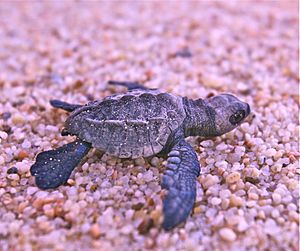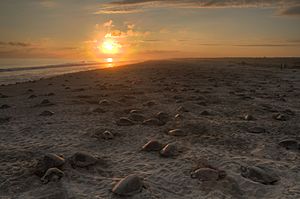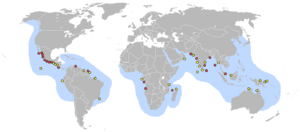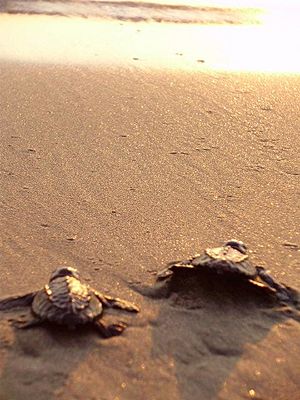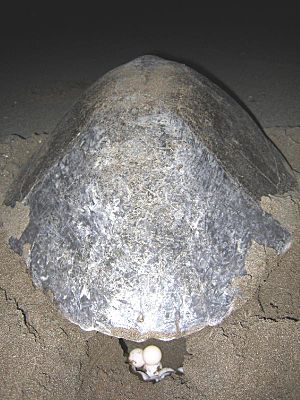Olive ridley sea turtle facts for kids
Quick facts for kids Olive ridley |
|
|---|---|
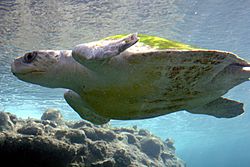 |
|
| Conservation status | |
| Scientific classification | |
| Kingdom: | |
| Class: | |
| Order: | |
| Family: | |
| Genus: |
Lepidochelys
|
| Binomial name | |
| Lepidochelys olivacea |
|
The olive ridley sea turtle (Lepidochelys olivacea) is also called the Pacific ridley. It is one of the smallest types of sea turtle. This turtle gets its name from the olive-green color of its heart-shaped shell. It is one of seven kinds of marine turtles living in the world today.
Contents
What Does the Olive Ridley Look Like?
The olive ridley turtle is about 2 feet (60 cm) long. It gets its name from its olive-green shell. The shell is shaped like a heart and is rounded.
Both male and female turtles grow to the same size. But females have a slightly more rounded shell than males. Their head has a short snout. The sides of the head curve inward.
They have front flippers that look like paddles. Each flipper has two claws. Their upper shell is grayish-green or olive. Sometimes, it looks reddish because of algae growing on it.
Baby turtles, called hatchlings, are dark gray. They look all black when they are wet. Young turtles also have three ridges on their back. The middle ridge makes them look jagged until they grow up.
Where Do Olive Ridley Turtles Live?
The olive ridley turtle lives in the warm waters of the Pacific and Indian Oceans. You can find them from India to Japan and down to Australia. They also live off the coast of Africa.
In the Atlantic Ocean, they are seen near West Africa and the coasts of northern Brazil, Suriname, Guyana, French Guiana, and Venezuela. They have also been found in the Caribbean Sea, as far north as Puerto Rico.
What is Their Habitat Like?
Most olive ridley turtles are found close to shore. They like protected, shallow ocean waters. These waters are usually 22–55 meters (72–180 feet) deep.
Sometimes, olive ridleys are seen in the open ocean. These turtles use different habitats as they grow. They move to different places during their lives.
What Do Olive Ridley Turtles Eat?
The olive ridley is mostly a meat-eater. This is especially true when they are young. They often eat jellyfish, tunicates, sea urchins, bryozoans, clams, snails, shrimp, crabs, and worms.
When they are in the open ocean, they might eat jellyfish and fish eggs. Olive ridleys also eat stringy algae if other food is not available. Sometimes, in captivity, they have even been seen eating each other.
What Threats Do They Face?
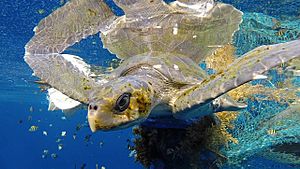
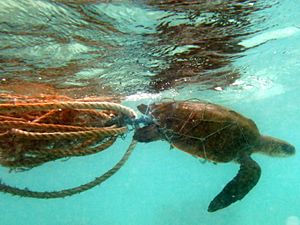
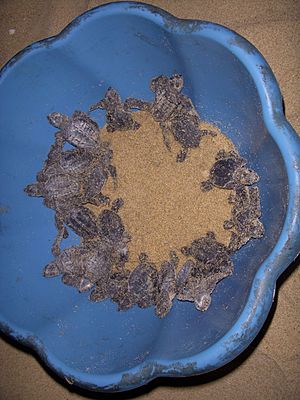
Many animals try to eat olive ridley eggs. These include raccoons, coyotes, wild dogs, pigs, opossums, and ghost crabs.
When baby turtles hatch, they must cross the beach to reach the water. During this journey, they can be eaten by vultures, frigate birds, crabs, and snakes.
Once in the water, young turtles might be eaten by large oceanic fish, sharks, and crocodiles. Adult turtles have few predators. Sharks and killer whales sometimes attack them. On land, jaguars might attack nesting female turtles.
Why Are Olive Ridley Turtles Important to People?
In the past, people used olive ridley turtles for food, bait, oil, and leather. Their meat is not a special dish, but their eggs are.
Collecting turtle eggs is against the law in most countries where these turtles nest. However, these laws are often not strongly enforced. Some places have tried to allow a small, legal egg harvest. This helps the local people earn money while trying to protect the turtles.
See also
 In Spanish: Tortuga golfina para niños
In Spanish: Tortuga golfina para niños



